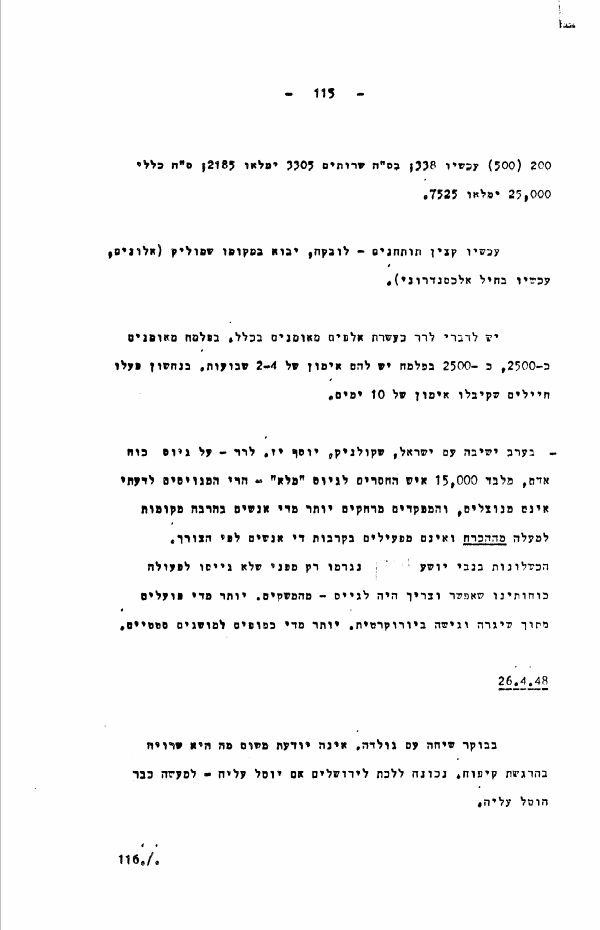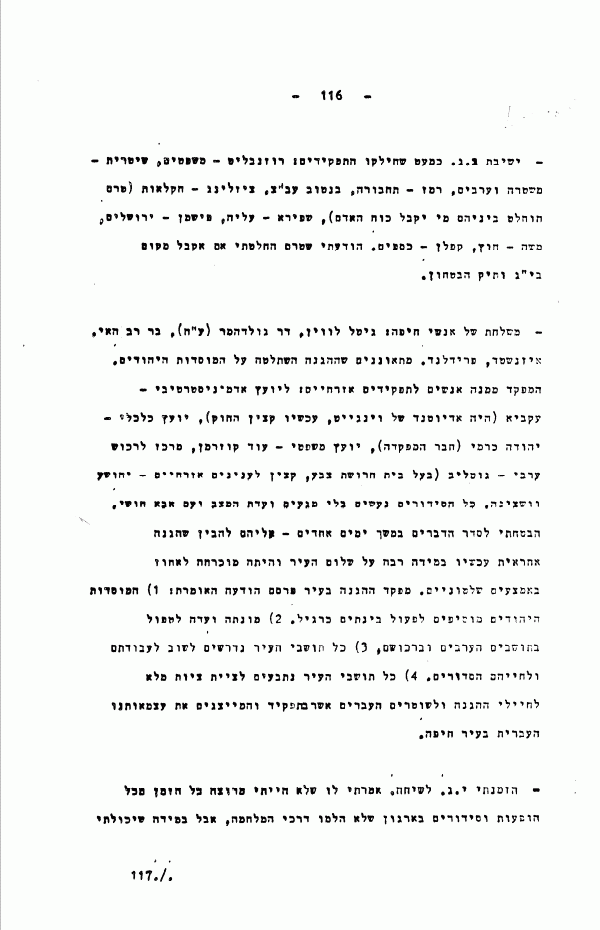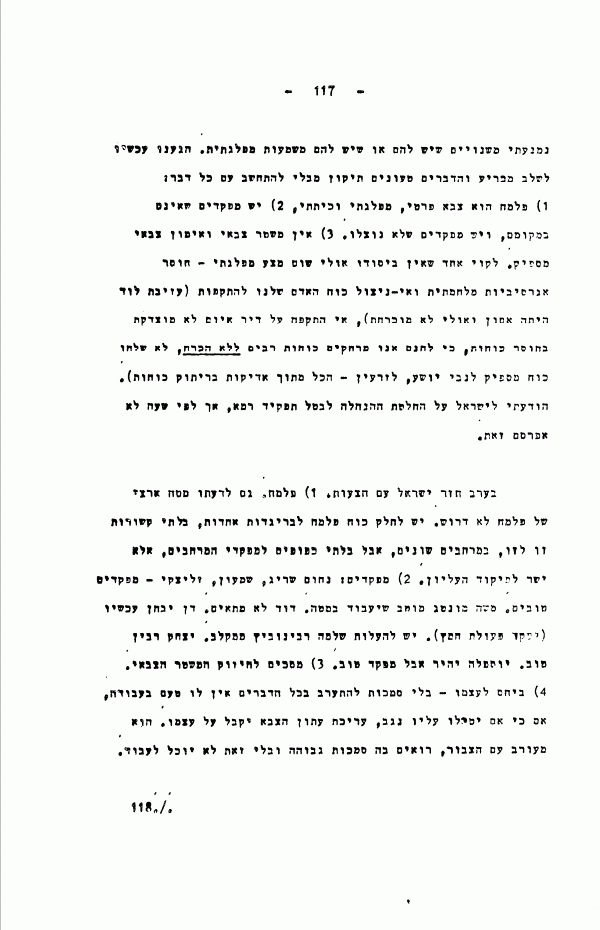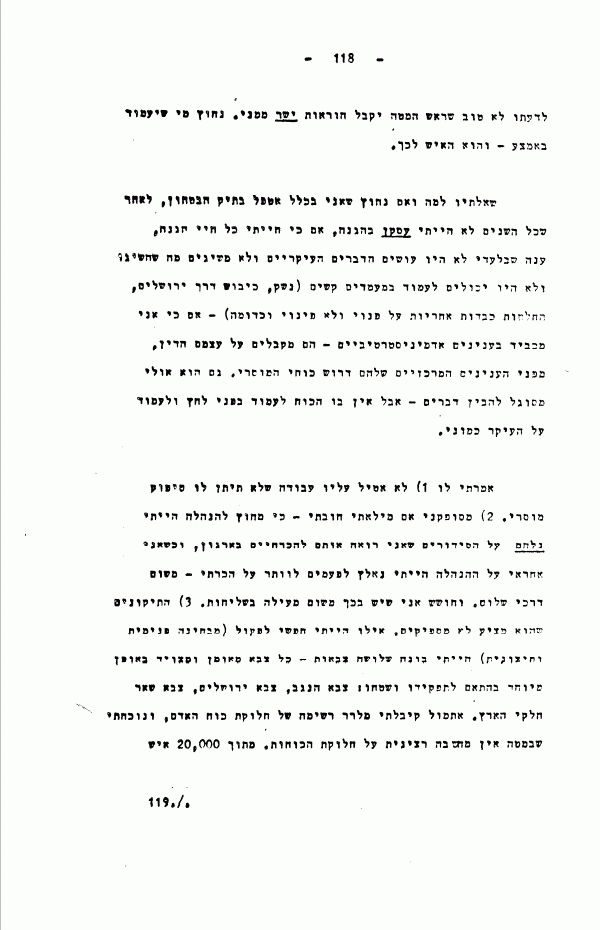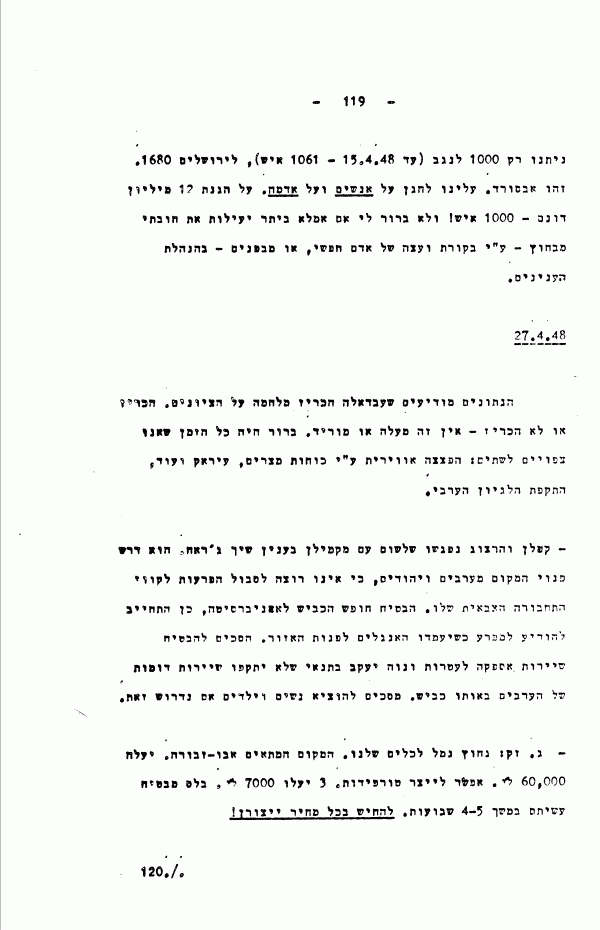1
of
Places:
Avigdor
Haifa
Jerusalem
Dan
Lod
Shamir
People:
The use of the photograph is subject to the Copyright Law, 2007
26.04.1948
224008
April 26, 1948 In the morning, a talk with Golda [Meir]. She doesn’t know why she’s wallowing in the sense of being mistreated. She’s willing to go to Jerusalem if instructed to do so.—In fact, she’s already been instructed to do so. - A meeting of the yod-gimmel [“the 13,” the provisional government or People’s Administration]. Almost all the positions have been handed out: Rosenblüth [Pinchas Rosen]—Justice, [Bechor] Sheetrit—Police and Arabs, [David] Remez—Transport, [Mordechai] Bentov—Public Works and [Labor], [Aharon Zisling—Agriculture (which of them will get the Manpower portfolio has not yet been decided). [Moshe] Shapira—Immigration, [Rabbi Yehuda Leib] Fishman—Jerusalem, Moshe [Sharett]—Foreign Affairs, [Eliezer] Kaplan—Finance. I stated that I have not yet decided whether to accept a place in the yod-gimmel and the defense bureau. - A delegation of Haifa people: Gottle-Levin, [Adv.] Dr. Goldhammer [the ‘Aliya Hadasha Party], [Adv. David] Bar-Rav-Hai, Eisenstadt [Avigdor Eshet], Friedland [Uriel Shallon]. They complain that the Haganah has taken over the Jewish institutions [in Haifa]. The commander is appointing people to civilian posts: as Administrative Advisor—[Avraham] Akavia (he was Wingate’s adjutant [in Ethiopia, now a district officer); Economic Advisor—Yehuda Carmi (member of headquarters), Legal Advisor—Adv. [Joseph] Kreismann, Administrator of Arab Property—[Dr. Adolf] Gottlieb (owner of the Tseva factory), Civilian Affairs Officer—Yehoshua Woscyna. All the arrangements are being done without contact with the Situation Committee and Abba Khoushy. I promised to put things in order within a few days—they have to realize that the Haganah is now the main player in charge of maintaining peace in the city and it had to seize the levers of government. The Haganah commander in the city issued a statement saying: (1) the Jewish institutions are continuing to operate normally for the time being. (2) A committee to deal with the Arab residents and their property has been appointed. (3) All townspeople are ordered to return to their jobs and their regular lives. (4) All townspeople must fully obey Haganah soldiers and Hebrew police on duty, who represent our Hebrew independence in the city of Haifa. - I invited Yisrael Galili for a talk. I told him that I wasn’t always satisfied with all appearances and arrangements at “the organization” [the Haganah] that were unsuited to war needs, but I did my best to refrain from changes that would have party implications. We have now reached a decisive stage and things have to be corrected without taking everything into account: (1) The Palmach is a private, partisan, and sectarian army. (2) There are commanders who are out of place and commanders who haven’t been utilized. (3) Military regimen and military training are insufficient. One deficiency that probably doesn’t trace to a party platform—lack of war aggressiveness and failure to use our people for attacks. (Leaving [the] Lod [airfield] was a disaster and may have been unnecessary, the failure to attack Deir Ayoub is unjustified by the lack of forces, because we pinned down large forces unnecessarily for the garrison force. They didn’t sent enough forces to Nebi Yusha, Zar’in, all of it due to strictness about pinning down forces.) I apprised Yisrael of the Executive’s decision to do away with the position of Chief of National Headquarters, but I won’t go public with it for now. In the evening, Yisrael returned with some suggestions: (1) Palmach. Yisrael agrees that a Palmach national headquarters isn’t needed. The Palmach forces should be divided into several brigades, unrelated to each other, in different areas, subordinate not to the area commanders but directly to the high command. (2) Commanders: Nahum Sarig, Moshe Zelicki (Carmel)—good commanders. Moshe Montag [Mann]: it’s best for him to work at headquarters. David [Shaltiel] isn’t suitable. Dan [Even] will be tested now (he’ll command Operation Hametz). Shlomo Rabinowitz (Shamir) [and] [Mordechai] Makleff should be promoted. Yitzhak Rabin is good. Yossele Tabenkin is haughty but he’s a good commander. (3) [He] agrees about strengthening the military regimen. (4) As for himself—without the power to intervene in all these things he sees no point in his work, although if they tell him to take charge of the Negev [or] to edit the military newspaper, he’ll do it. He’s involved with the public, they consider him a high authority, and if he hasn’t got it he cannot work. In his opinion, it isn’t good for a chief of staff to take orders directly from me. Someone standing in the middle is needed—and he’s the man for it. I asked him why it’s necessary for me to deal with the defense bureau at all. For all those years, I was not a functionary with the Haganah, although my whole life has been a haganah [defense] life. He answered: without me they wouldn’t do the important things and they wouldn’t have attained what they attained and stood fast in difficult occasions (weapons, conquering the road to Jerusalem, highly responsible decisions about evacuation, non-evacuation, etc.). Although I burden [them] with administrative matters, they accept the verdict because their important matters require my moral force. He, too, may be able to understand things—but he hasn’t the strength to withstand pressure and insist on what really counts, like me. I told him: (1) I won’t assign him to work that won’t give him moral gratification. (2) I doubt that I did my duty—because [if I had been] outside the Executive I would have fought for the arrangements that I consider essential in the “Organization” [but] when I am answerable to the Executive, sometimes I’ve had to forgo what I knew—for reasons of peaceful relations, and I fear this amounts to dereliction of duty. (3) The corrections that he proposes aren’t enough. If I were free to act (internally and externally), I would build three armies—each army especially trained and equipped for its role and territory: a Negev army, a Jerusalem army, and an army for the rest of the country. Yesterday I received from Lehrer [M. Zadok] a partial list of the distribution of our manpower and I realized that there is no serious thinking at the staff about the distribution of the forces. Of 20,000 men, only 1,000 were assigned to the Negev (and up to April 15, 1948—1,061 men) [and] 1,680 to Jerusalem. It’s absurd. We have to defend people and land. To defend 12 million dunams—1,000 men! It’s not clear to me whether I would do my duty more effectively from the outside—by giving criticism and advice as a free man—or from the inside, by running things.





